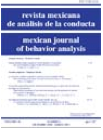THE EFFECTS OF CONCURRENTLY TRAINING TWO RELATIONS ON HUMAN PERFORMANCE IN A CONDITIONAL DISCRIMINATION TASK
Main Article Content
Abstract
The purpose of this study was te evaluate if efficiency in the acquisition and transfer of first-order matching te sampla is affected by the order of concurrently training two acquisition tasks, a high laval of instructional specificity, and continuous feedback. One group of high scheol students was tramad en similarity and diffarence, in that order, while anothar group of students received similar training but in reverse order. For aach group, training was followed by three transfar tests, presentad in an order that matched that of the relevant training sequence. Subjects in both groups were highly efficient during training. Eight of tha tan subjects required only two or three training sessiens te learn tha two tasks. However, during the transfer tests the subjects in the similaritydifference group wera superior te those tramad in the reversed erder. Thesa results contradict fha notion that concurrant training delays acquisition but facilitates transfer. The saquence of training seems te have an important effect en transfer. The presant data are analyzad in terms of the covariatiens implicit in diffarant training sequences.
